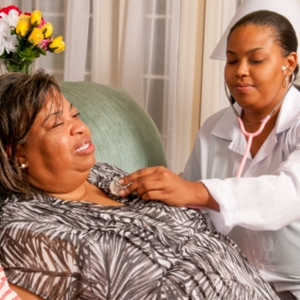
A simple checklist could help doctors estimate whether an older patient will be alive 10 years from now, according to a new study.
Researchers hope the findings, reported in the Journal of the American Medical Association, will help older adults and their doctors come to better decisions on health care.
There currently are national guidelines on medical procedures like colon cancer screening and mammography screening for breast cancer - but they give general guidance, not individual.
The checklist could help better tailor advice to older patients, said lead researcher Dr Marisa Cruz.
"It's meant to be used in a clinical context, to help doctors and older patients discuss screening and other interventions," said Cruz, a clinical fellow at the School of Medicine at the University of California, San Francisco.
Guidelines based on averages
Guidelines on cancer screening tests and other interventions vary, but they are based on averages. And some guidelines suggest age cutoffs for screening, because there's a lack of evidence that the tests benefit the average person past a certain age.
Colon cancer screening is one example. The US Preventive Services Task Force, an independent panel that advises the federal government, says that for most people, colon cancer screening should begin at age 50 and continue only until age 75. Other groups, including the American Cancer Society, do not give an upper age limit, but say doctors should consider an older patient's overall health and life expectancy. For an elderly person in poor health, an aggressive treatment or even a screening test could do more harm than good.
On the other hand, a 75-year-old in good health could live many more years, and may benefit from cancer screenings or aggressive treatments, such as tight blood sugar control in people with diabetes.
Cruz said the checklist used in the new study aims to help older adults get the tests or treatments that might benefit them, and avoid potentially harmful ones.
What it does not do, Cruz said, is give any one person a "cut-and-dried prediction" of what will happen in the next 10 years.
How it was done
The researchers created the checklist based on data from a national study of nearly 20 000 US adults older than 50. They found that 12 factors, considered together, can give an idea of an older adult's risk of dying within 10 years.
Those include age, sex, weight, smoking and whether a person has diabetes, lung disease, heart disease or physical limitations such as difficulty walking a few blocks or moving large objects.
Doctors can get that information using yes-or-no questions, and then assign points for each answer, Cruz said. If you're between 60 and 64 years old, for example, you get one point; if you're 65 to 69 years old, you get two points.
People with a total score of one have, on average, a 5 percent chance of dying in the next 10 years. A score of five translates to a 23% chance of dying within a decade, while a score of 10 corresponds to a 70% risk.
None of that is set in stone, Cruz said, but the scoring system breaks people into "rough categories" of risk.
Having an idea of an older patient's life expectancy is important because some medical interventions "take a long time to pay off," said Dr James Pacala, president of the American Geriatrics Society.
An idea from evidence
"Most cancer screenings, for example, take five to 10 years to pay off," Pacala said. For an older person unlikely to live that long, the risks of screening - such as false-positive results, needless invasive tests and anxiety - are likely to outweigh any benefit.
"If you care for older patients, this is something you always have running in the back of your mind," Pacala said. "What is the rest of this patient's life likely to look like?"
Right now, he said, doctors can get an idea by looking up average life expectancy for a patient based on age and sex, and then considering that person's overall health. The checklist in this study, Pacala said, offers a more "formal" way to do that.
"This provides us with evidence-based numbers," he said.
Pacala stressed, however, that decisions on whether to screen for or treat a disease should not be based solely on a number. He said longevity estimates should be used to facilitate discussions between doctors and patients.
A doctor not involved in the study agreed.
"There is absolutely a need for better tools for understanding life expectancy," said Dr Ethan Basch, an oncologist and director of the cancer outcomes research program at the University of North Carolina School of Medicine, in Chapel Hill.
But no life-expectancy calculator - or any single guideline - is enough, Basch said. "This is one piece of information to help an older patient make an informed, rational decision," he said.
Basch chaired the American Society of Clinical Oncology committee that recently developed the group's guideline on PSA screening for prostate cancer. The society suggests that doctors discuss PSA screening with men who are expected to live for more than 10 years.
PSA screening is controversial because prostate cancer is often slow-growing and will never threaten a man's life. Even if screening catches a prostate tumor, many men may be treated unnecessarily.
For a man expected to live fewer than 10 years, the ASCO says the potential harms of PSA screening seem to outweigh the benefits. For men with a longer life expectancy, the group says things are not so clear-cut, and having a conversation with your doctor might be worthwhile.
More information
Learn more about screening tests from the US Preventive Services Task Force.




 Publications
Publications
 Partners
Partners














